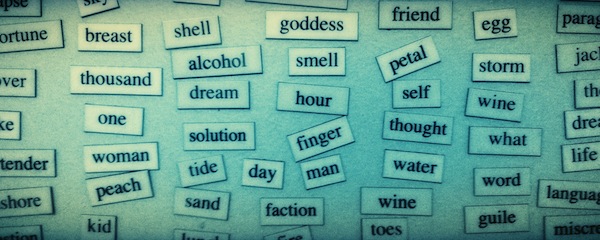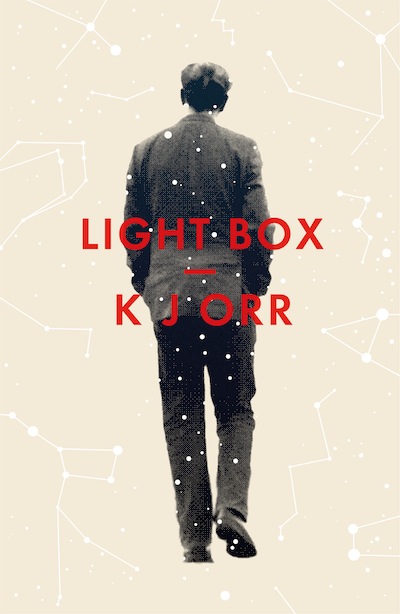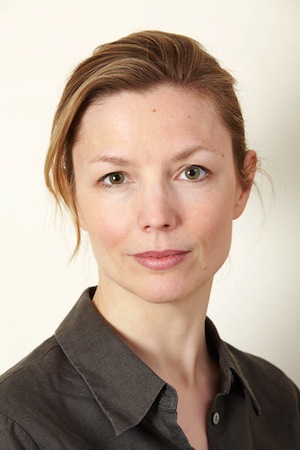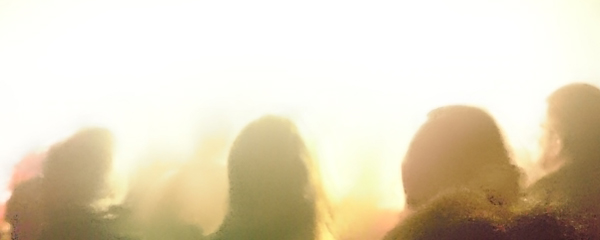
photo © Shelly, 2012
by K J Orr
As a short story writer my relationship with poetry is marked most of all by a lack of self-consciousness: by lightness, flexibility, pure pleasure. Friends recommend poems, or poets, and I magpie favoured fragments, which are charged too with my own memories of time and place and connection. Poetry, for me, is the most personal of forms.
Recently, following spinal surgery, laid up in bed and surfing my days on Tramadol, I hallucinated unfamiliar people, places, buildings. These images would appear, vivid against a black backdrop, replete with miniaturist detail. One would replace another in quick succession, but each was clearly defined, insistent and haunting. Although my energy levels were low, and reading was a challenge for a time, in the moments of lucidity I had poetry best answered the state I was in. It made the time count. As a reading experience – embodied and sensory, as well as interrogative and abstract – poetry made sense, and offered a fullness in the moment that carried over.
In reading short stories, and in writing them too, I seek this compressed charge, but it is rare that it can be found out of context in a single sentence or image. Alice Munro, one of the contemporary masters of the genre, has claimed that when reading short stories she will start anywhere she likes. It is a claim that relates to her own approach to writing stories, which she has likened to moving from room to room in a house. While this metaphor makes sense to me as a writer – I consider the scope for such shifts of perspective one of the gifts of the narrative structure associated with the form – as a reader I am baffled by the idea of starting a story anywhere but at the beginning. The short story is a hybrid form, often drawing on a combination of narrative and poetic elements, and tends to gather its layers of meaning incrementally. While the story’s compressions – for instance, metaphorical resonance and dissonance, and elliptical play – can be as startling and memorable as those of poetry, it is rare that they are achieved in a moment; generally they take time.
Of course, the desire to formally categorise can lead to an almost wilful disregard for inter-genre commerce. Poetry, the short story and the novel all trade in generic liminalities. The novel can be poetic; the poem narrative; the short story long or short, a work of ‘flash fiction’, or a single sentence – just read Lydia Davis. The metamorphic potential of a form is presumably one of the reasons that writers keep writing, and readers keep reading. It is the reason that as a writer, reading a genre or form you do not write can be so inspiring, and the reason, as a reader, an active relationship with a text can be so rewarding.
 The question of where a writer hopes to send their reader is pertinent here, because both the poet and the short story writer, more often than the novelist, are keen to include and to challenge the reader in just such an active relationship – pushing them to leave the security of a narrative handrail and to participate in a conjuring act, in a liminal realm. Such work is dual; involving both dialogue between writer and reader, and also the solitude, the subjectivity, that any reader response entails. Often it demands an engagement with the elusive – in association, in the process of metaphorical interpretation, and where open-endedness is offered up in place of closure.
The question of where a writer hopes to send their reader is pertinent here, because both the poet and the short story writer, more often than the novelist, are keen to include and to challenge the reader in just such an active relationship – pushing them to leave the security of a narrative handrail and to participate in a conjuring act, in a liminal realm. Such work is dual; involving both dialogue between writer and reader, and also the solitude, the subjectivity, that any reader response entails. Often it demands an engagement with the elusive – in association, in the process of metaphorical interpretation, and where open-endedness is offered up in place of closure.
Reader response is revealing in another respect; this question of where the writer hopes to send their reader comes hand in hand with that of where the reader is prepared to go. Sarah Hall, in a piece celebrating the short story for the Guardian, acknowledged that while she considers the form ‘inordinately respectful’ to the reader, not every reader wants to be ‘left to decide what everything might mean’. Not every reader is looking for such an active relationship – and this may be reason enough for some to steer clear of the form entirely.
Chris Power has since written about various dangers attached to the ‘unavoidable narrative of the short story as neglected form’, and one danger pertinent to this question of the form’s readership is that of ‘discussing the short story in the shadow of the novel’. It is, as Power points out in The Short Story is Dead! Long Live the Short Story!, commonplace for reviewers who are seeking to praise a short story, or collection of stories, to suggest that the work could almost be a novel. This is frustrating for more reasons than one: not only does it promote the ‘false idea that short stories are a stage on the developmental arc that has its apogee in the novel’, but it neglects discussion of the short story as a form in its own right, ‘as something as separate from the novel as poetry’.
Power is absolutely right that reviewers and publishers do the short story no favours with ‘wrongheaded’ comparisons to the novel; right to point out that this ‘limits the discourse, limits what a story can be’. Such comparisons, in this context, are indeed diminishing. But is it possible to consider the short story as a form entirely distinct from others? And is it in fact desirable if, as I have suggested, the metamorphic potential of a form will be considered, by some writers and readers, to be one of its most compelling qualities?
Any consideration of potential routes to more helpful discourse around the short story is complicated both by the fact that just as not every reader will want the same thing, not every short story will do the same thing. If – and I believe this is a fair claim – the short story has yet to find its place in the UK as a form whose capacities are familiar, respected and widely celebrated, might this not relate to a genuine interpretative bafflement? How should one read a short story? What should one expect? This issue is directly related to its hybrid nature, its liminality: it is both a blessing and a curse to be a threshold form, thieving, one might say, from the novel and the poem, yet claiming to be neither. As such a shape-shifter, what exactly does the form expect? How is the reader to anticipate rules of engagement; modes of reading? To pick up a sonnet, or a four hundred-page novel, generally involves clarity of intention in the reader, an understanding that their time and energy is being invested in a particular way (with the proviso, of course, that poems and novels can be shape-shifters too).
Hall suggests that the short story ‘dictates its own exclusivity’, that it can challenge the reader as much as the writer. Power suggests the form ‘is not easy’, that ‘it requires undivided attention’. For me, one of the great pleasures of the form is the element of uncertainty: not being sure – as a writer and as a reader – where a story might take me. I love that the short story makes no promises, that there is no template, that as a form its terms are threshold terms. And while uncertainty will not be welcome for every reader, it is important that this quality is nonetheless recognised in any bid to create space around the form and to honour it in its own right. As important as they are, attempts at definition will always carry the danger of diminution: of not allowing a form its full range.
Working with short stories I have come to understand just how much narrative expectation can inform its threshold terms: the anticipation of a sense of journey, or ordered progression, with the unfolding of something at least close to a beginning, middle and end; anticipation of the ending as a form of ordering principle, as a way to make sense of the whole. There is so much scope, therefore, for writers to engage with such anticipation: scope for doublings, for troubling juxtapositions, for time-bending narrative switchbacks and circularities – those analeptic and proleptic leaps that can be giddy-making, revelatory, devastating in the short space of reading time the story claims.
Poetry, perhaps more than the story, offers its gymnastics in an obsessive attention to the capacity of words, in its careful interrogations of language, in its agility, its elasticity, on a sentence level. Its love affair with language means that even a single sentence taken out of context can, for me, be enough. As a writer often drawn to a pared simplicity of language in the story, I read poetry with a slack-jawed wonderment at that love affair. I read to expose myself to the depth-charges poems are capable of, with the hope of incorporating equivalent power in my own work. I read knowing that poetry is a form that can stop me, taking me straight to the tender, troubling heart of things.
Like the short story, poetry has the ability to give the reader a space to dwell with difficulty. I love this. This is why I read. Instead of completion, or the envelopment of understanding, we are left with instability, and unsolved puzzles.
If it were a house – to go back to Munro – for me it would be one that has seen better days, or partly been destroyed. Some of the walls would have crumbled. Holes would open the interior to the air. Foundations, perhaps, would be visible. A house that is a contradiction: replete not because it is intact, but as an absent-presence, calling out to the imagination. It is with just such generosity to the reader that literature most often takes my breath away, leaving me maybe wounded, maybe exhilarated, but always, always, with the feeling that I am included, participant, and very much connected through words.
~
 K J Orr is an award-winning writer whose short fiction has appeared in publications including The Irish Times, The Dublin Review, The White Review and The Sunday Times Magazine, and been broadcast on BBC Radio 4. Her work has featured in Best British Short Stories and has been shortlisted for the BBC National Short Story Award. She has published author interviews and critical work on the short story. Her debut collection, Light Box, was published in February 2016.
K J Orr is an award-winning writer whose short fiction has appeared in publications including The Irish Times, The Dublin Review, The White Review and The Sunday Times Magazine, and been broadcast on BBC Radio 4. Her work has featured in Best British Short Stories and has been shortlisted for the BBC National Short Story Award. She has published author interviews and critical work on the short story. Her debut collection, Light Box, was published in February 2016.
~
This feature was first published in slightly different form in The Poetry Review, Volume 103:2, Summer 2013.
Author photo © Lottie Davies


Wonderful piece. And your point, Mike, is a good one. Of course writers can cross forms, but many prizes have for judges novelists who aren’t published story writers, so you wonder what gets missed in their search for filo or shortcrust. I even read one such judge suggest entrants should make sure all their lose ends are tied up, as if irresolution, along with subtext and obliquity, wasn’t a fundamental quality of the modern story.
Enjoyed this article….Pritchett said the short story springs ‘from a poetic rather than a prosaic impulse.’ One of my beefs is with short story competitions that describe their judges as ‘novelists’! (might as well say they are pastry chefs).